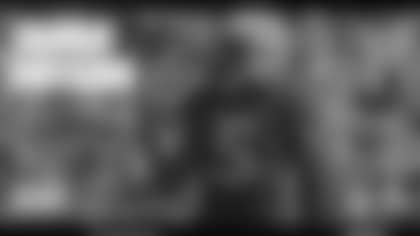When Dexter Manley stepped on the football field, steam spewed from his helmet. The defensive end lifted intensity to a new level, and he never took a play off while bringing a special passion to the game.
A Redskin for nine seasons in the 1980s, Manley set a franchise-record 97.5 sacks that still stands.
Manley could have gone down as one of the greatest defensive ends ever.
A package of ferociousness combined with unmitigated speed and power, the 6-3, 257-pounder was one of the most feared pass rushers in the 1980s and posted the most sacks in the NFL from 1982-86. (He totaled 64 in that span.)
He has been a preliminary nominee for Pro Football Hall of Fame induction. But his chances of being enshrined are slim because he failed four drug tests in his career and was forced to retire from the NFL in his 12th season in 1991.
His involvement with drugs is his top regret in life.
"I grew up in Houston's third ward in the ghetto and fought guys older than me. I never lost a fight, I never lost a battle," he said. "But I lost this war to cocaine. I let drugs interfere and rob me and pimp me and prostitute me, and it took everything from me because I lost the desire to be the best football player. I lost focus.
"I had these great dreams, but my dreams were fading away because I was caught up in cocaine."
During his playing days, there was never a dull moment with Manley. He spewed outrageous comments and displayed a flamboyance that caused many eyes to roll. All along, he was modeling himself after another bombastic quote machine, boxing legend Muhammad Ali.
Manley predicted he'd be the MVP of Super Bowl XVII, a distinction earned by John Riggins after the Redskins' 27-17 win over Miami.
He sported a Mohawk haircut (which Riggins once did, too) during training camp one year and called himself "Mr. D," a take on the popular actor "Mr. T."
Before a game against the San Francisco 49ers, Manley vowed to "ring" the clock of quarterback Joe Montana, a metaphorical error.
He once wore red and electric-blue Spiderman practice tights and dark Blues Brothers-style sunglasses during non-contact drills.
And he mocked Gen. Alexander Haig by telling him, "I'm in charge here." As Secretary of State, Haig had incorrectly declared himself to be in charge of the White House after President Reagan was shot in 1981.
Fellow defensive end Charles Mann, a long-time teammate, said Manley's headline-grabbing remarks made him who he was.
"People loved Dexter Manley," Mann said. "And fans from other teams loved to hate Dexter Manley. It was a marketing ploy. He's selling jerseys, and the mystique of Dexter Manley was alive and well."
The Redskins picked Manley out of Oklahoma State in the fifth round of the 1981 NFL Draft. He played as a pass-rushing specialist in his first few games before breaking into the starting lineup. (The NFL started keeping official sack records in 1982.)
Manley grandly entered the lexicon of Redskins fans in the 1982 postseason, making what would go down as his signature sack: he knocked Cowboys quarterback Danny White out of the NFC Championship game with a concussion.
Manley later tipped a screen pass that fell into the hands of defensive tackle Darryl Grant, who took the ball into the end zone for the score that punched the Redskins' ticket to Super Bowl XVII. It remains one of the most famous plays in Redskins history.
Manley's sack totals rose in each of the next four seasons, and he earned his first and only Pro Bowl appearance in 1986, his greatest year as a pro. He posted 18 sacks, second in the league to Giants linebacker Lawrence Taylor. The sack total is a Redskins record that still stands.
Many news services selected him for their All-NFL teams, and the NFL Players Association named him NFC Defensive Lineman of the Year.
His four sacks against the Giants on Oct. 2, 1988, has him in a three-way tie for first in the Redskins' record books for single-game sacks, along with tackle Diron Talbert and end Phillip Daniels.
Offenses showered Manley with respect, often double-teaming the right end by putting a tight end or H-back on his side. The only defensive end who came close to his speed and power at the time, Manley said, was the Eagles' 6-5, 300-pound Reggie White, who's now in the Hall of Fame.
"Most players don't have the speed and the power that I had," said Manley, who ran a 4.5 40-yard dash, bench-pressed more than 500 pounds and often played out of control, a formidable combination.
He said: "I had the power to run right over a 300-pound lineman. I'd fire off the ball, run three or four steps, and hit him right in the facemask, catching him off guard. That makes them think, 'I don't know what's coming next from this guy.'"
Currently, Manley does speaking engagements and runs his own foundation called "Dexter's Team," which focuses on battling drug addiction and illiteracy, improving parenting skills and emphasizing education.
Michael Richman is the author of The Redskins Encyclopedia, a 432-page book that spans the 75-year history of the storied franchise. His Web site www.redskinshistorian.com.





